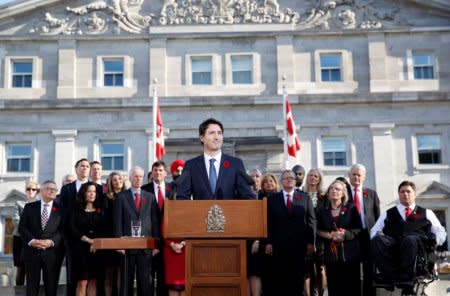Trade dispute, policy divisions hang over Trudeau trip to China

Thomson Reuters
By David Ljunggren
OTTAWA (Reuters) - Canadian Prime Minister Justin Trudeau visits Beijing this week seeking deeper ties with China but a dispute over canola exports, government divisions over China policy and the case of a detained citizen look set to limit his gains.
China welcomed last year's election victory by Trudeau's Liberals, recalling with fondness that his father Pierre Trudeau was prime minister when Canada formally established relations with Beijing in 1970.
But nostalgia will only go so far as the two sides discuss contentious issues.
China, the world's second largest economy, is expected to try to sell Trudeau, who left for China on Monday, on a free trade treaty similar to the pacts Beijing has sealed with Australia and New Zealand.
But there is no near-term chance of agreement, a senior Canadian government official told reporters last week.
"We're looking to deepen trade with China, though no decision has been made on any kind of formal free trade agreement at this point," the official said.
Well-placed sources said last month there were major divisions inside Ottawa as to how much Canada should open its markets and economy to China. One person directly involved in the matter said this was still the case.
"The government is effectively paralyzed over its China policy," the source said.
The two nations are also arguing about shipments of Canadian canola, with tougher Chinese inspection standards due to come into force on Sept. 1 that threaten C$2 billion ($1.5 billion) in annual exports.
Trade Minister Chrystia Freeland said last week that relations between the two nations could not deepen until the matter was resolved.
Trudeau, who officials said would raise the matter, says Canada wants more foreign investment while ensuring Canadian firms enjoy access to Chinese markets.
"These are the interests that we are going to be strongly and carefully balancing as we engage with the economic powerhouse that is China," he told reporters on Friday.
While in Beijing, Trudeau will sign a number of unspecified "high value commercial agreements," said the senior government official, who gave no details.
The two sides are set to announce annual high-level meetings, said another government source, describing this as an important symbolic gesture.
In a statement, China's embassy in Ottawa said "we expect the two sides can reach more consensus in the areas of political contacts, trade and economic cooperation."
Trudeau also said he would raise China's human rights record, an issue of great sensitivity in Beijing.
Although Ottawa is pressing the case of Canadian citizen Kevin Garratt, who was indicted in China on charges of spying and stealing state secrets earlier this year, the second government source said there was no sign he would be released soon.
($1=$1.30 Canadian)
(Editing by Jeffrey Benkoe)
See Also:

 Yahoo News
Yahoo News 
